Supportive or Destructive: Relationships in George Eliot's Middlemarch
VerifiedAdded on 2022/10/04
|7
|1853
|264
Essay
AI Summary
This essay analyzes the relationships between key characters in George Eliot's novel, Middlemarch, focusing on the dynamics between Dorothea Brooke and Will Ladislaw, as well as Rosamond Vincy and Tertius Lydgate. The essay explores how these characters either support or harm each other, examining the complexities of their interactions within the context of societal expectations and personal desires. The analysis delves into the motivations and behaviors of each character, highlighting the impact of these relationships on their individual development and overall experiences within the novel. The essay draws on critical perspectives to evaluate the nuances of these relationships and their significance in illustrating Eliot's exploration of human nature and social dynamics. The essay further discusses the impact of education for women in the novel and how the characters are affected by social and economic boundaries. The essay also explores the marriage between Dorothea and Edward Casaubon and Rosamond and Tertius Lydgate and the breakdown of their relationship. The essay concludes by emphasizing the importance of understanding and communication in successful relationships, illustrating how a lack of these qualities can lead to the destruction of marriages and the unhappiness of the characters involved.
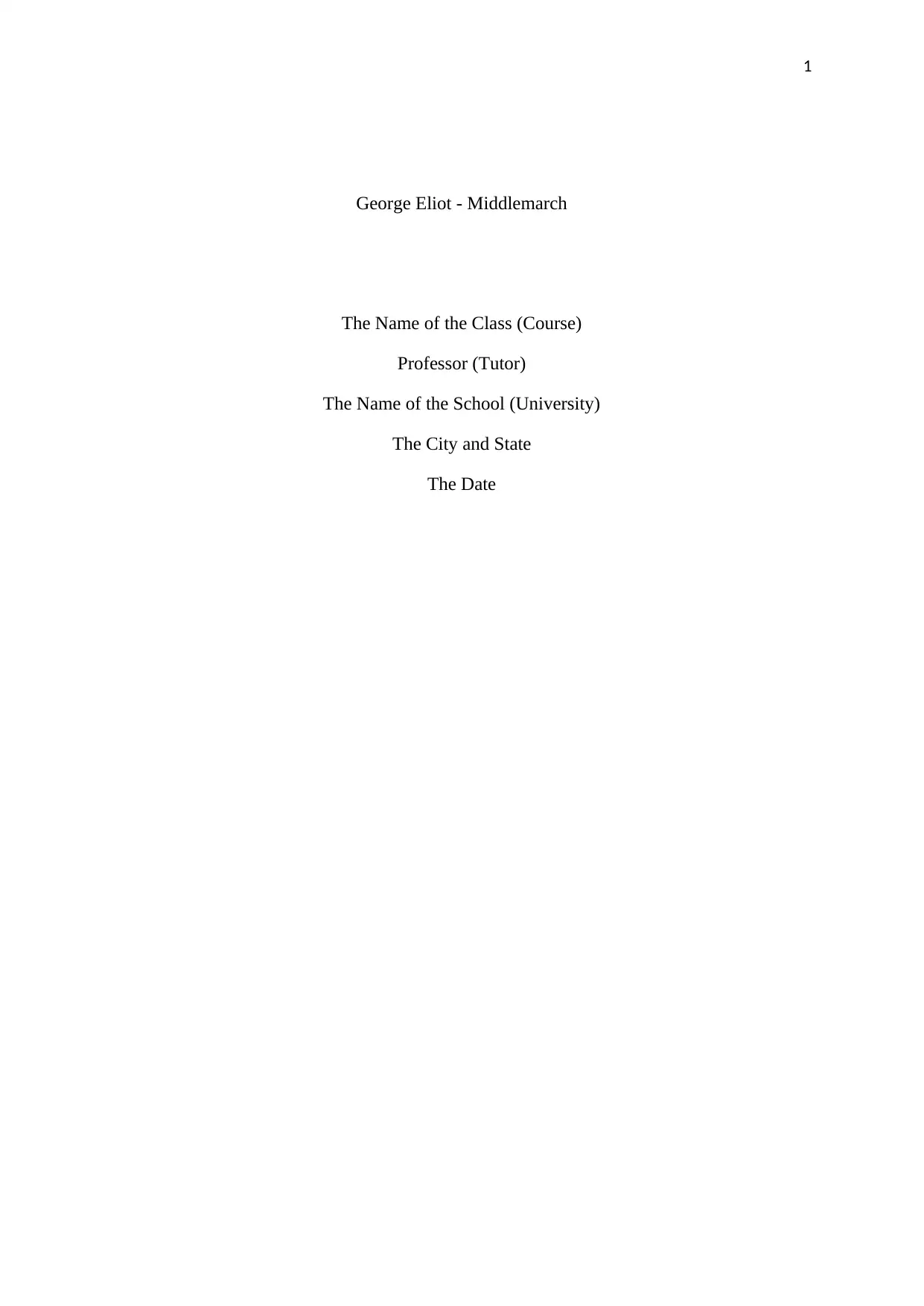
1
George Eliot - Middlemarch
The Name of the Class (Course)
Professor (Tutor)
The Name of the School (University)
The City and State
The Date
George Eliot - Middlemarch
The Name of the Class (Course)
Professor (Tutor)
The Name of the School (University)
The City and State
The Date
Paraphrase This Document
Need a fresh take? Get an instant paraphrase of this document with our AI Paraphraser
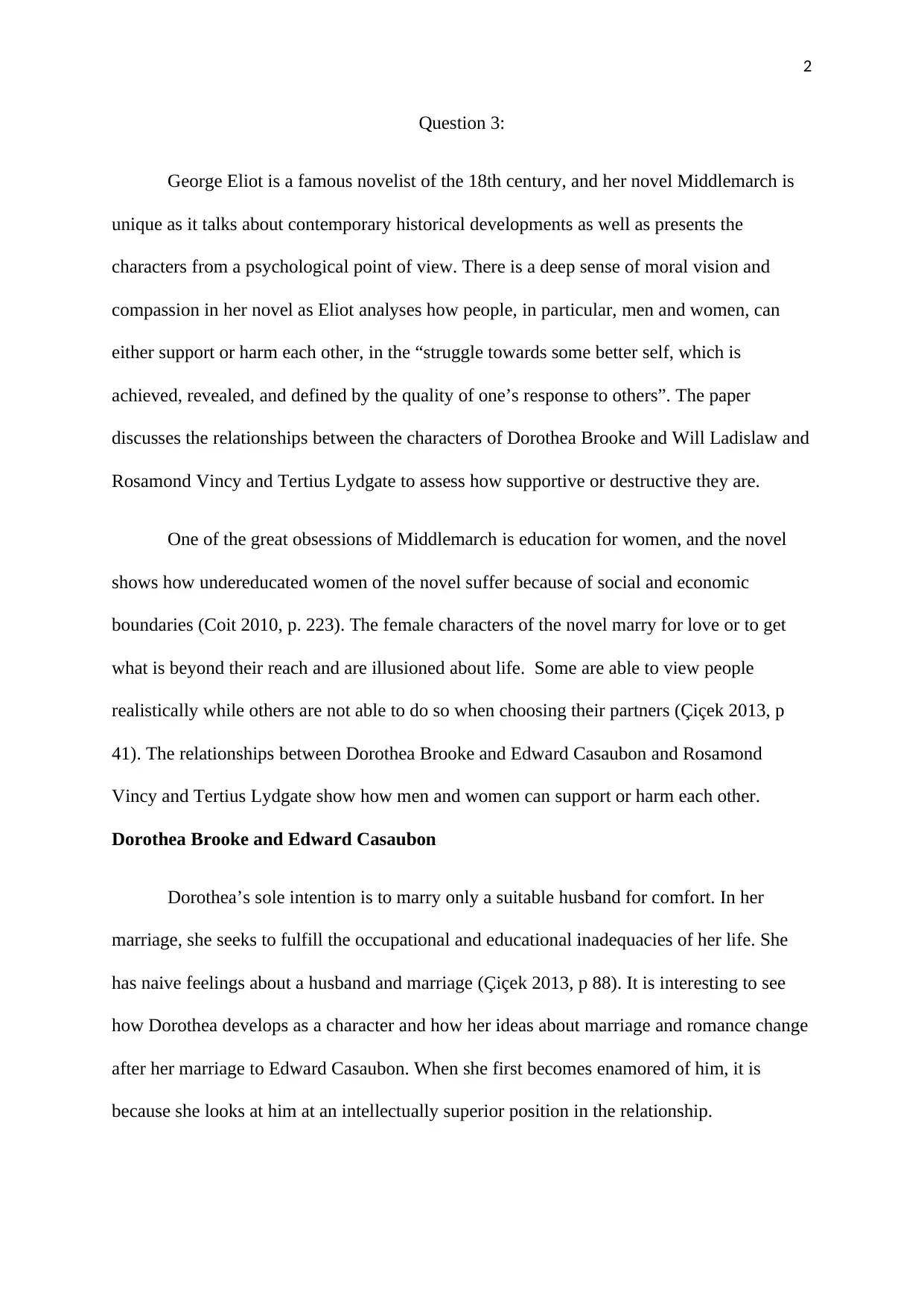
2
Question 3:
George Eliot is a famous novelist of the 18th century, and her novel Middlemarch is
unique as it talks about contemporary historical developments as well as presents the
characters from a psychological point of view. There is a deep sense of moral vision and
compassion in her novel as Eliot analyses how people, in particular, men and women, can
either support or harm each other, in the “struggle towards some better self, which is
achieved, revealed, and defined by the quality of one’s response to others”. The paper
discusses the relationships between the characters of Dorothea Brooke and Will Ladislaw and
Rosamond Vincy and Tertius Lydgate to assess how supportive or destructive they are.
One of the great obsessions of Middlemarch is education for women, and the novel
shows how undereducated women of the novel suffer because of social and economic
boundaries (Coit 2010, p. 223). The female characters of the novel marry for love or to get
what is beyond their reach and are illusioned about life. Some are able to view people
realistically while others are not able to do so when choosing their partners (Çiçek 2013, p
41). The relationships between Dorothea Brooke and Edward Casaubon and Rosamond
Vincy and Tertius Lydgate show how men and women can support or harm each other.
Dorothea Brooke and Edward Casaubon
Dorothea’s sole intention is to marry only a suitable husband for comfort. In her
marriage, she seeks to fulfill the occupational and educational inadequacies of her life. She
has naive feelings about a husband and marriage (Çiçek 2013, p 88). It is interesting to see
how Dorothea develops as a character and how her ideas about marriage and romance change
after her marriage to Edward Casaubon. When she first becomes enamored of him, it is
because she looks at him at an intellectually superior position in the relationship.
Question 3:
George Eliot is a famous novelist of the 18th century, and her novel Middlemarch is
unique as it talks about contemporary historical developments as well as presents the
characters from a psychological point of view. There is a deep sense of moral vision and
compassion in her novel as Eliot analyses how people, in particular, men and women, can
either support or harm each other, in the “struggle towards some better self, which is
achieved, revealed, and defined by the quality of one’s response to others”. The paper
discusses the relationships between the characters of Dorothea Brooke and Will Ladislaw and
Rosamond Vincy and Tertius Lydgate to assess how supportive or destructive they are.
One of the great obsessions of Middlemarch is education for women, and the novel
shows how undereducated women of the novel suffer because of social and economic
boundaries (Coit 2010, p. 223). The female characters of the novel marry for love or to get
what is beyond their reach and are illusioned about life. Some are able to view people
realistically while others are not able to do so when choosing their partners (Çiçek 2013, p
41). The relationships between Dorothea Brooke and Edward Casaubon and Rosamond
Vincy and Tertius Lydgate show how men and women can support or harm each other.
Dorothea Brooke and Edward Casaubon
Dorothea’s sole intention is to marry only a suitable husband for comfort. In her
marriage, she seeks to fulfill the occupational and educational inadequacies of her life. She
has naive feelings about a husband and marriage (Çiçek 2013, p 88). It is interesting to see
how Dorothea develops as a character and how her ideas about marriage and romance change
after her marriage to Edward Casaubon. When she first becomes enamored of him, it is
because she looks at him at an intellectually superior position in the relationship.
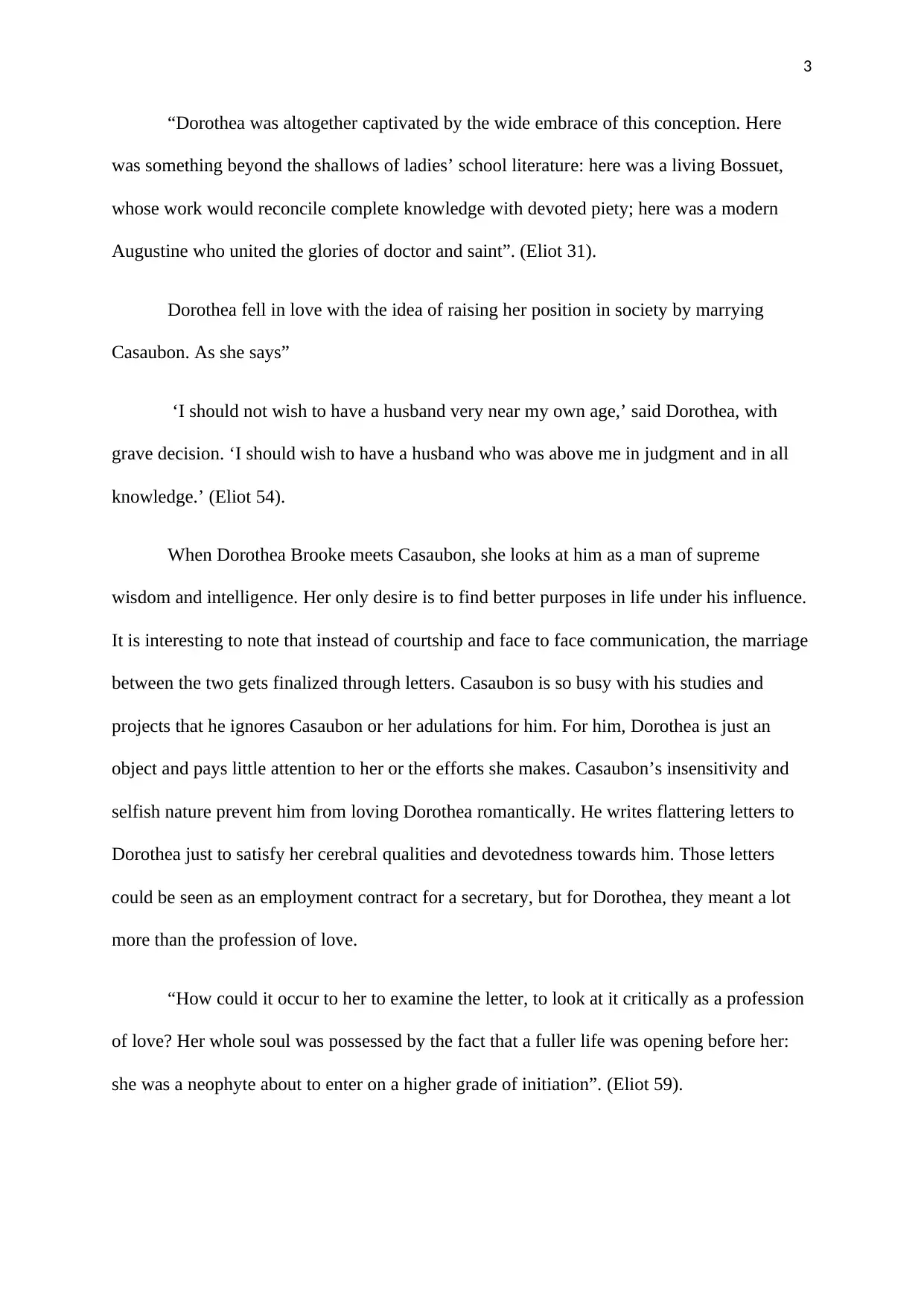
3
“Dorothea was altogether captivated by the wide embrace of this conception. Here
was something beyond the shallows of ladies’ school literature: here was a living Bossuet,
whose work would reconcile complete knowledge with devoted piety; here was a modern
Augustine who united the glories of doctor and saint”. (Eliot 31).
Dorothea fell in love with the idea of raising her position in society by marrying
Casaubon. As she says”
‘I should not wish to have a husband very near my own age,’ said Dorothea, with
grave decision. ‘I should wish to have a husband who was above me in judgment and in all
knowledge.’ (Eliot 54).
When Dorothea Brooke meets Casaubon, she looks at him as a man of supreme
wisdom and intelligence. Her only desire is to find better purposes in life under his influence.
It is interesting to note that instead of courtship and face to face communication, the marriage
between the two gets finalized through letters. Casaubon is so busy with his studies and
projects that he ignores Casaubon or her adulations for him. For him, Dorothea is just an
object and pays little attention to her or the efforts she makes. Casaubon’s insensitivity and
selfish nature prevent him from loving Dorothea romantically. He writes flattering letters to
Dorothea just to satisfy her cerebral qualities and devotedness towards him. Those letters
could be seen as an employment contract for a secretary, but for Dorothea, they meant a lot
more than the profession of love.
“How could it occur to her to examine the letter, to look at it critically as a profession
of love? Her whole soul was possessed by the fact that a fuller life was opening before her:
she was a neophyte about to enter on a higher grade of initiation”. (Eliot 59).
“Dorothea was altogether captivated by the wide embrace of this conception. Here
was something beyond the shallows of ladies’ school literature: here was a living Bossuet,
whose work would reconcile complete knowledge with devoted piety; here was a modern
Augustine who united the glories of doctor and saint”. (Eliot 31).
Dorothea fell in love with the idea of raising her position in society by marrying
Casaubon. As she says”
‘I should not wish to have a husband very near my own age,’ said Dorothea, with
grave decision. ‘I should wish to have a husband who was above me in judgment and in all
knowledge.’ (Eliot 54).
When Dorothea Brooke meets Casaubon, she looks at him as a man of supreme
wisdom and intelligence. Her only desire is to find better purposes in life under his influence.
It is interesting to note that instead of courtship and face to face communication, the marriage
between the two gets finalized through letters. Casaubon is so busy with his studies and
projects that he ignores Casaubon or her adulations for him. For him, Dorothea is just an
object and pays little attention to her or the efforts she makes. Casaubon’s insensitivity and
selfish nature prevent him from loving Dorothea romantically. He writes flattering letters to
Dorothea just to satisfy her cerebral qualities and devotedness towards him. Those letters
could be seen as an employment contract for a secretary, but for Dorothea, they meant a lot
more than the profession of love.
“How could it occur to her to examine the letter, to look at it critically as a profession
of love? Her whole soul was possessed by the fact that a fuller life was opening before her:
she was a neophyte about to enter on a higher grade of initiation”. (Eliot 59).
⊘ This is a preview!⊘
Do you want full access?
Subscribe today to unlock all pages.

Trusted by 1+ million students worldwide
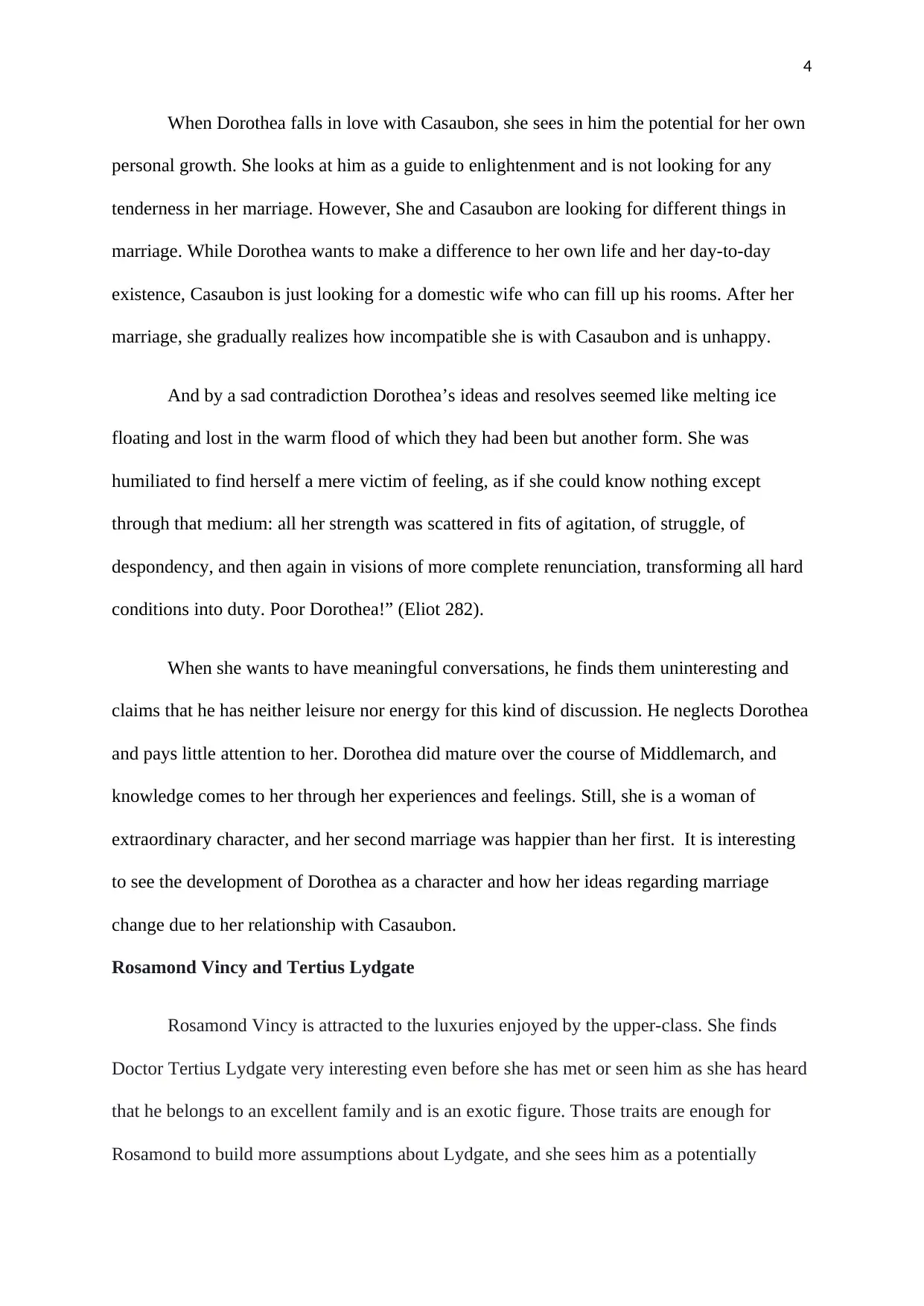
4
When Dorothea falls in love with Casaubon, she sees in him the potential for her own
personal growth. She looks at him as a guide to enlightenment and is not looking for any
tenderness in her marriage. However, She and Casaubon are looking for different things in
marriage. While Dorothea wants to make a difference to her own life and her day-to-day
existence, Casaubon is just looking for a domestic wife who can fill up his rooms. After her
marriage, she gradually realizes how incompatible she is with Casaubon and is unhappy.
And by a sad contradiction Dorothea’s ideas and resolves seemed like melting ice
floating and lost in the warm flood of which they had been but another form. She was
humiliated to find herself a mere victim of feeling, as if she could know nothing except
through that medium: all her strength was scattered in fits of agitation, of struggle, of
despondency, and then again in visions of more complete renunciation, transforming all hard
conditions into duty. Poor Dorothea!” (Eliot 282).
When she wants to have meaningful conversations, he finds them uninteresting and
claims that he has neither leisure nor energy for this kind of discussion. He neglects Dorothea
and pays little attention to her. Dorothea did mature over the course of Middlemarch, and
knowledge comes to her through her experiences and feelings. Still, she is a woman of
extraordinary character, and her second marriage was happier than her first. It is interesting
to see the development of Dorothea as a character and how her ideas regarding marriage
change due to her relationship with Casaubon.
Rosamond Vincy and Tertius Lydgate
Rosamond Vincy is attracted to the luxuries enjoyed by the upper-class. She finds
Doctor Tertius Lydgate very interesting even before she has met or seen him as she has heard
that he belongs to an excellent family and is an exotic figure. Those traits are enough for
Rosamond to build more assumptions about Lydgate, and she sees him as a potentially
When Dorothea falls in love with Casaubon, she sees in him the potential for her own
personal growth. She looks at him as a guide to enlightenment and is not looking for any
tenderness in her marriage. However, She and Casaubon are looking for different things in
marriage. While Dorothea wants to make a difference to her own life and her day-to-day
existence, Casaubon is just looking for a domestic wife who can fill up his rooms. After her
marriage, she gradually realizes how incompatible she is with Casaubon and is unhappy.
And by a sad contradiction Dorothea’s ideas and resolves seemed like melting ice
floating and lost in the warm flood of which they had been but another form. She was
humiliated to find herself a mere victim of feeling, as if she could know nothing except
through that medium: all her strength was scattered in fits of agitation, of struggle, of
despondency, and then again in visions of more complete renunciation, transforming all hard
conditions into duty. Poor Dorothea!” (Eliot 282).
When she wants to have meaningful conversations, he finds them uninteresting and
claims that he has neither leisure nor energy for this kind of discussion. He neglects Dorothea
and pays little attention to her. Dorothea did mature over the course of Middlemarch, and
knowledge comes to her through her experiences and feelings. Still, she is a woman of
extraordinary character, and her second marriage was happier than her first. It is interesting
to see the development of Dorothea as a character and how her ideas regarding marriage
change due to her relationship with Casaubon.
Rosamond Vincy and Tertius Lydgate
Rosamond Vincy is attracted to the luxuries enjoyed by the upper-class. She finds
Doctor Tertius Lydgate very interesting even before she has met or seen him as she has heard
that he belongs to an excellent family and is an exotic figure. Those traits are enough for
Rosamond to build more assumptions about Lydgate, and she sees him as a potentially
Paraphrase This Document
Need a fresh take? Get an instant paraphrase of this document with our AI Paraphraser
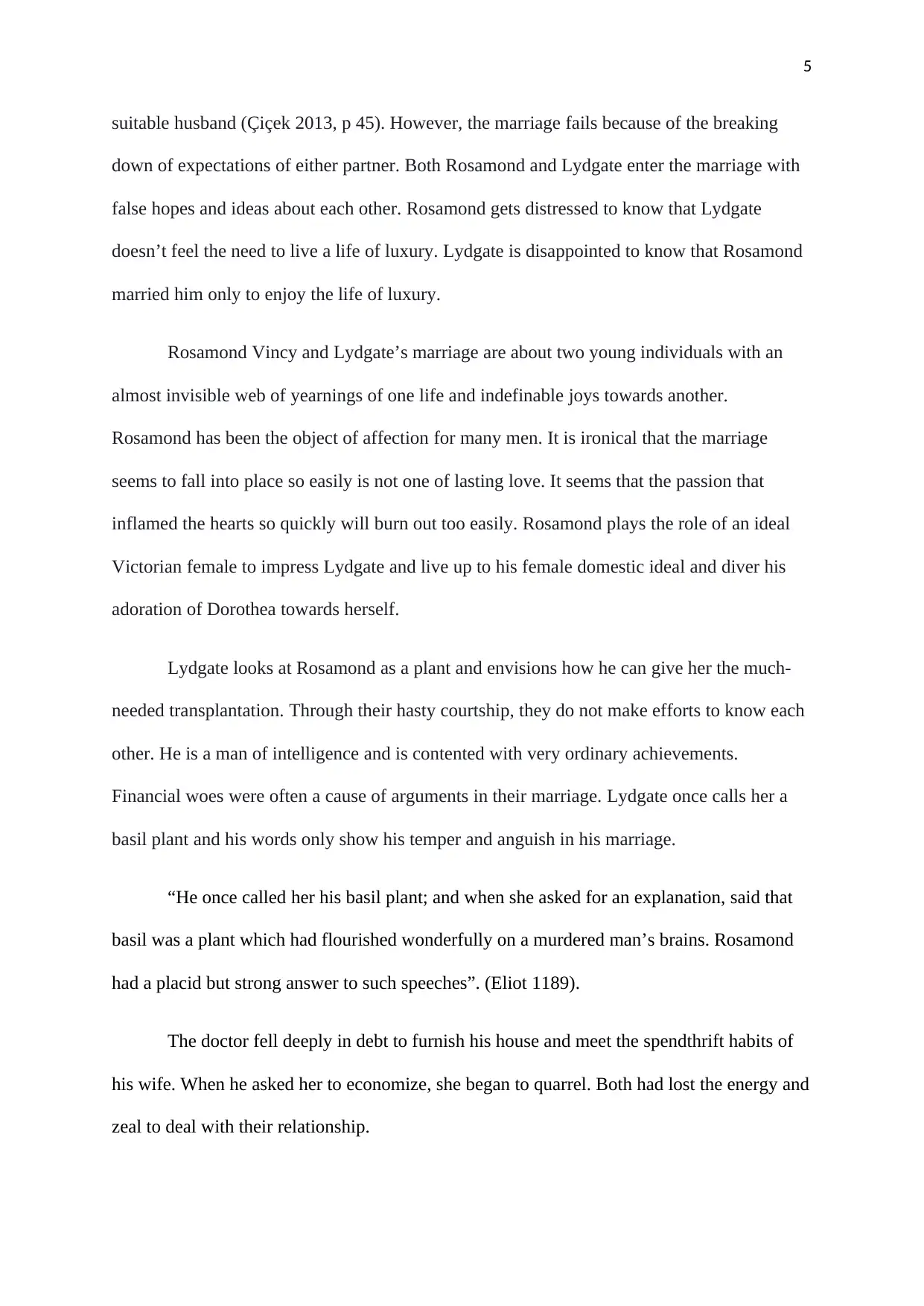
5
suitable husband (Çiçek 2013, p 45). However, the marriage fails because of the breaking
down of expectations of either partner. Both Rosamond and Lydgate enter the marriage with
false hopes and ideas about each other. Rosamond gets distressed to know that Lydgate
doesn’t feel the need to live a life of luxury. Lydgate is disappointed to know that Rosamond
married him only to enjoy the life of luxury.
Rosamond Vincy and Lydgate’s marriage are about two young individuals with an
almost invisible web of yearnings of one life and indefinable joys towards another.
Rosamond has been the object of affection for many men. It is ironical that the marriage
seems to fall into place so easily is not one of lasting love. It seems that the passion that
inflamed the hearts so quickly will burn out too easily. Rosamond plays the role of an ideal
Victorian female to impress Lydgate and live up to his female domestic ideal and diver his
adoration of Dorothea towards herself.
Lydgate looks at Rosamond as a plant and envisions how he can give her the much-
needed transplantation. Through their hasty courtship, they do not make efforts to know each
other. He is a man of intelligence and is contented with very ordinary achievements.
Financial woes were often a cause of arguments in their marriage. Lydgate once calls her a
basil plant and his words only show his temper and anguish in his marriage.
“He once called her his basil plant; and when she asked for an explanation, said that
basil was a plant which had flourished wonderfully on a murdered man’s brains. Rosamond
had a placid but strong answer to such speeches”. (Eliot 1189).
The doctor fell deeply in debt to furnish his house and meet the spendthrift habits of
his wife. When he asked her to economize, she began to quarrel. Both had lost the energy and
zeal to deal with their relationship.
suitable husband (Çiçek 2013, p 45). However, the marriage fails because of the breaking
down of expectations of either partner. Both Rosamond and Lydgate enter the marriage with
false hopes and ideas about each other. Rosamond gets distressed to know that Lydgate
doesn’t feel the need to live a life of luxury. Lydgate is disappointed to know that Rosamond
married him only to enjoy the life of luxury.
Rosamond Vincy and Lydgate’s marriage are about two young individuals with an
almost invisible web of yearnings of one life and indefinable joys towards another.
Rosamond has been the object of affection for many men. It is ironical that the marriage
seems to fall into place so easily is not one of lasting love. It seems that the passion that
inflamed the hearts so quickly will burn out too easily. Rosamond plays the role of an ideal
Victorian female to impress Lydgate and live up to his female domestic ideal and diver his
adoration of Dorothea towards herself.
Lydgate looks at Rosamond as a plant and envisions how he can give her the much-
needed transplantation. Through their hasty courtship, they do not make efforts to know each
other. He is a man of intelligence and is contented with very ordinary achievements.
Financial woes were often a cause of arguments in their marriage. Lydgate once calls her a
basil plant and his words only show his temper and anguish in his marriage.
“He once called her his basil plant; and when she asked for an explanation, said that
basil was a plant which had flourished wonderfully on a murdered man’s brains. Rosamond
had a placid but strong answer to such speeches”. (Eliot 1189).
The doctor fell deeply in debt to furnish his house and meet the spendthrift habits of
his wife. When he asked her to economize, she began to quarrel. Both had lost the energy and
zeal to deal with their relationship.
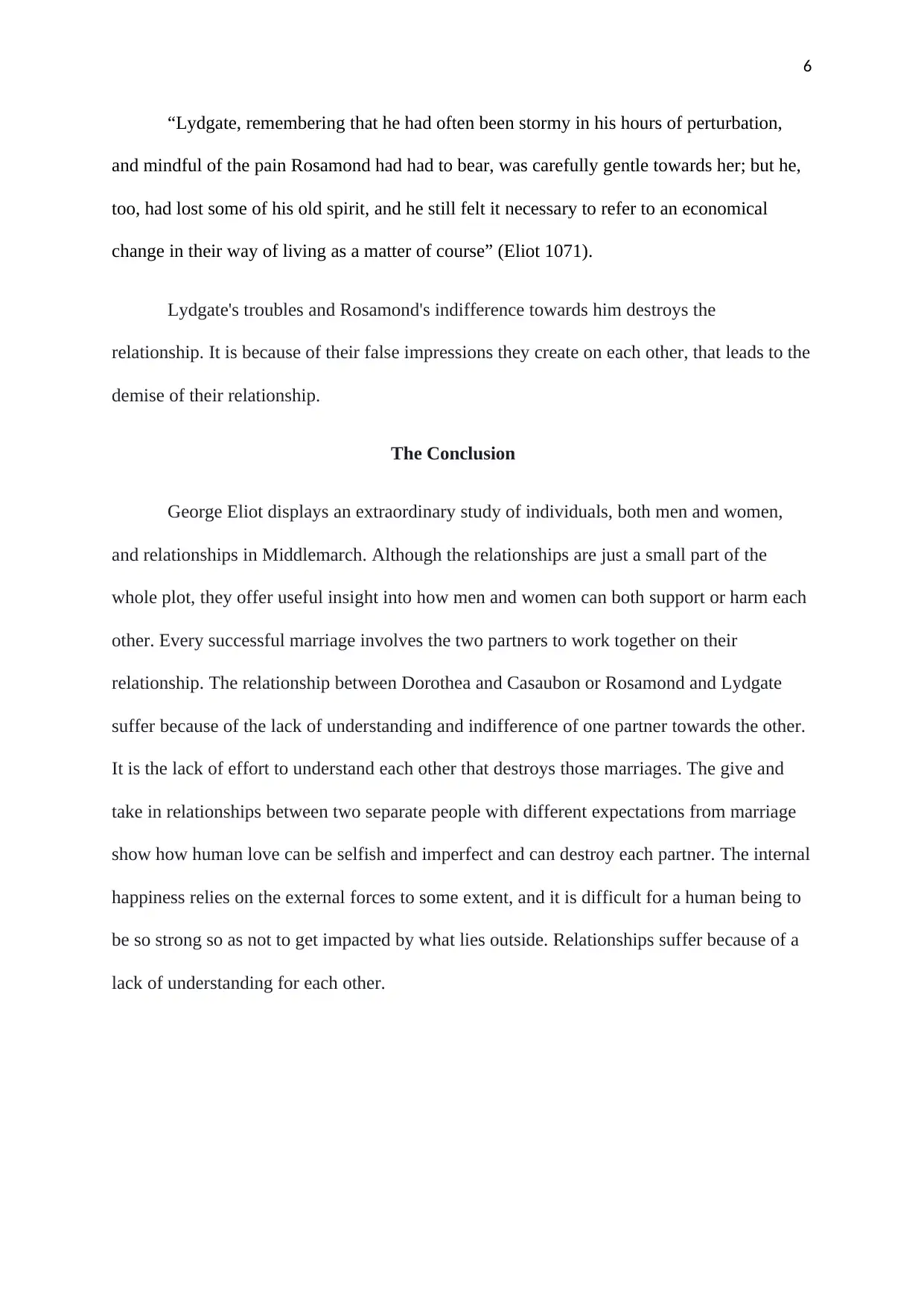
6
“Lydgate, remembering that he had often been stormy in his hours of perturbation,
and mindful of the pain Rosamond had had to bear, was carefully gentle towards her; but he,
too, had lost some of his old spirit, and he still felt it necessary to refer to an economical
change in their way of living as a matter of course” (Eliot 1071).
Lydgate's troubles and Rosamond's indifference towards him destroys the
relationship. It is because of their false impressions they create on each other, that leads to the
demise of their relationship.
The Conclusion
George Eliot displays an extraordinary study of individuals, both men and women,
and relationships in Middlemarch. Although the relationships are just a small part of the
whole plot, they offer useful insight into how men and women can both support or harm each
other. Every successful marriage involves the two partners to work together on their
relationship. The relationship between Dorothea and Casaubon or Rosamond and Lydgate
suffer because of the lack of understanding and indifference of one partner towards the other.
It is the lack of effort to understand each other that destroys those marriages. The give and
take in relationships between two separate people with different expectations from marriage
show how human love can be selfish and imperfect and can destroy each partner. The internal
happiness relies on the external forces to some extent, and it is difficult for a human being to
be so strong so as not to get impacted by what lies outside. Relationships suffer because of a
lack of understanding for each other.
“Lydgate, remembering that he had often been stormy in his hours of perturbation,
and mindful of the pain Rosamond had had to bear, was carefully gentle towards her; but he,
too, had lost some of his old spirit, and he still felt it necessary to refer to an economical
change in their way of living as a matter of course” (Eliot 1071).
Lydgate's troubles and Rosamond's indifference towards him destroys the
relationship. It is because of their false impressions they create on each other, that leads to the
demise of their relationship.
The Conclusion
George Eliot displays an extraordinary study of individuals, both men and women,
and relationships in Middlemarch. Although the relationships are just a small part of the
whole plot, they offer useful insight into how men and women can both support or harm each
other. Every successful marriage involves the two partners to work together on their
relationship. The relationship between Dorothea and Casaubon or Rosamond and Lydgate
suffer because of the lack of understanding and indifference of one partner towards the other.
It is the lack of effort to understand each other that destroys those marriages. The give and
take in relationships between two separate people with different expectations from marriage
show how human love can be selfish and imperfect and can destroy each partner. The internal
happiness relies on the external forces to some extent, and it is difficult for a human being to
be so strong so as not to get impacted by what lies outside. Relationships suffer because of a
lack of understanding for each other.
⊘ This is a preview!⊘
Do you want full access?
Subscribe today to unlock all pages.

Trusted by 1+ million students worldwide
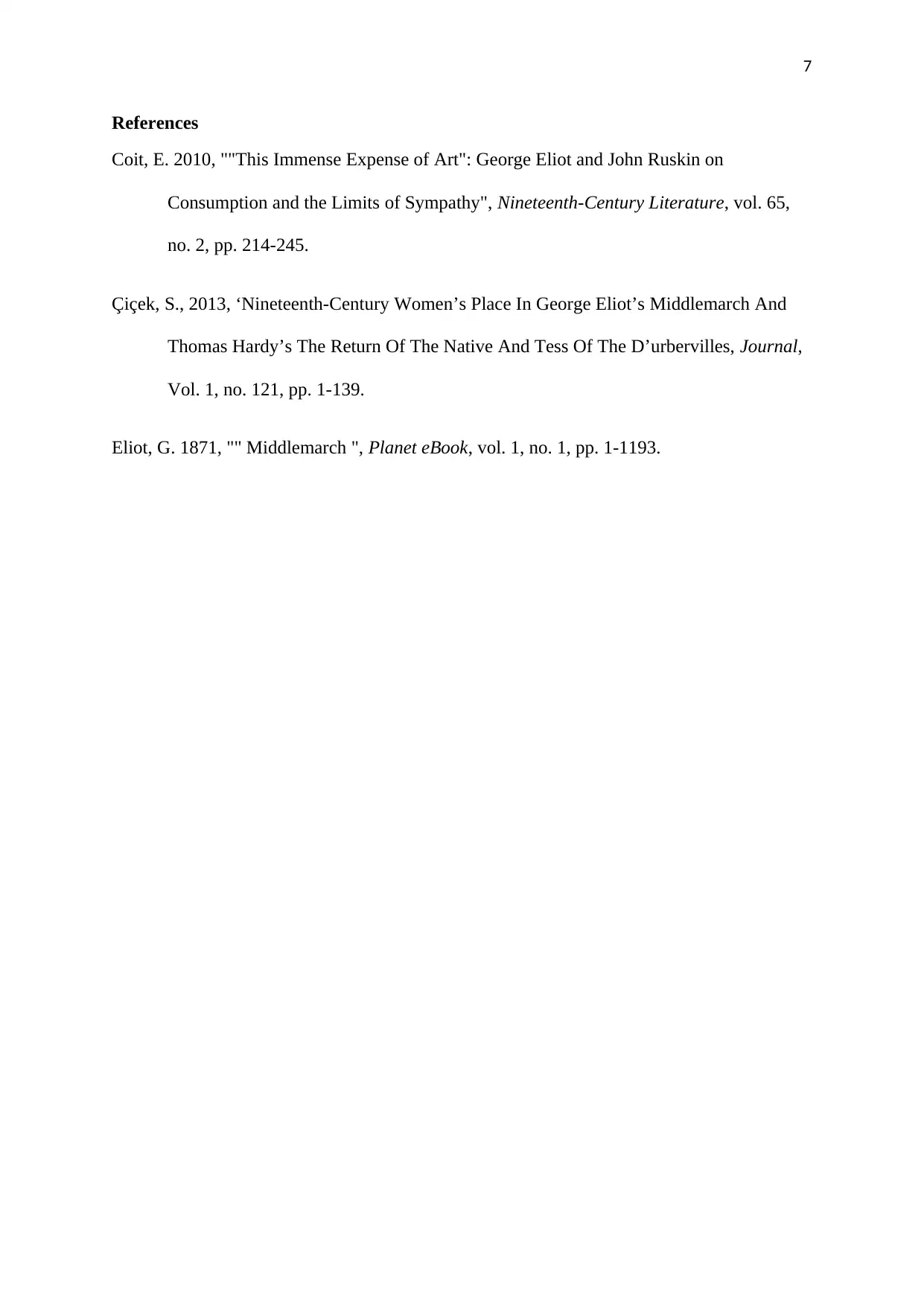
7
References
Coit, E. 2010, ""This Immense Expense of Art": George Eliot and John Ruskin on
Consumption and the Limits of Sympathy", Nineteenth-Century Literature, vol. 65,
no. 2, pp. 214-245.
Çiçek, S., 2013, ‘Nineteenth-Century Women’s Place In George Eliot’s Middlemarch And
Thomas Hardy’s The Return Of The Native And Tess Of The D’urbervilles, Journal,
Vol. 1, no. 121, pp. 1-139.
Eliot, G. 1871, "" Middlemarch ", Planet eBook, vol. 1, no. 1, pp. 1-1193.
References
Coit, E. 2010, ""This Immense Expense of Art": George Eliot and John Ruskin on
Consumption and the Limits of Sympathy", Nineteenth-Century Literature, vol. 65,
no. 2, pp. 214-245.
Çiçek, S., 2013, ‘Nineteenth-Century Women’s Place In George Eliot’s Middlemarch And
Thomas Hardy’s The Return Of The Native And Tess Of The D’urbervilles, Journal,
Vol. 1, no. 121, pp. 1-139.
Eliot, G. 1871, "" Middlemarch ", Planet eBook, vol. 1, no. 1, pp. 1-1193.
1 out of 7
Your All-in-One AI-Powered Toolkit for Academic Success.
+13062052269
info@desklib.com
Available 24*7 on WhatsApp / Email
![[object Object]](/_next/static/media/star-bottom.7253800d.svg)
Unlock your academic potential
Copyright © 2020–2026 A2Z Services. All Rights Reserved. Developed and managed by ZUCOL.
